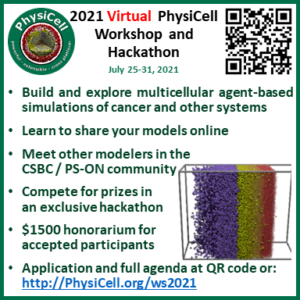Quick navigation: [Learn] [Do] [Benefits] [Flyer] [Agenda] [Tutorials] [Outcomes] [Apply]
PhysiCell is an open source, agent-based simulation framework for simulating complex multicellular systems. It simulates the chemical environment (diffusion of substrates and signaling factors), individual cell behaviors, and cell-cell interactions. It can be tailored to a broad variety of problems in cancer, infectious diseases, developmental biology, immunology, micro-ecosystems, and more.
PhysiCell won the 2019 PLoS Computational Biology Research Prize for Public Impact.
Click here to skip straight to the online application.
This NCI-funded workshop and hackathon will award a $1500 honorarium for up to 30 participants in consideration for their participation and to defray personal costs. Applicants should have prior experience in C++ or Python, with an interest in multicellular modeling.
What you’ll learn
- Build multiscale agent-based multicellular simulations in PhysiCell
- Integrate SBML network models in PhysiCell agents
- Share models online on nanoHUB
What you’ll do
- Attend morning sessions to learn PhysiCell
- Form a team in afternoon hackathon sessions to build a model or a tool
- Join and help drive the PhysiCell community as future leaders
Benefits and Prizes for Funded Participants!
- $1500 honorarium (up to 30 funded participants)
- PhysiCell swag mailed to your home
- Prizes for the best model and best tool
Download the Flyer and Spread the Word!
Please help spread the word!
- Download the flyer: PhysiCell_ws2021.
- Or retweet the official announcement.
- Share the official Instagram annoucement.
- Share a mini-poster on social media:

Draft Agenda (last revised April 25, 2021)
All times below are US Eastern Time. To avoid early starts for the West Coast or late ends for the East Coast and avoid “Zoom fatigue”, we will use the “flipped classroom” approach for some tutorial content.
The full detailed schedule is posted at PhysiCell-Training on GitHub.
Events marked E are closed-door, exclusive events to accepted participants.
Prior to workshop
June-July: Verify software setup. Use virtual office hours as needed for one-on-one help. Watch 2-4 pre-recorded tutorials.
Workshop Week
Sunday, July 25: Virtual social to meet fellow participants on GatherTown.
Monday, July 26:
pre-recorded: Introductory materials
Morning (11-1): First PhysiCell deep dive
Afternoon (1-3:30): Hands-on learning about cell phenotype
Evening (3:30-5): Hands-on cancer modeling example
Evening (5-6): First brainstorming session (E)
Tuesday, July 27:
pre-recorded: Microenvironment
Morning (11-1): Custom functions, microenvironment-driven phenotype,
Afternoon (1-2): Chemical communication
Afternoon (2-4): Brainstorming session (E)
Evening (4-6): Team formation (E)
Wednesday, July 28:
pre-recorded: Cell pressure, mechanofeedback, and contact testing
Morning (11-12): Contact-based interactions, predator-prey and “worm” examples
Afternoon (12-3): Hands-on integration of SBML signaling models
Evening (3-6): Team work time (E)
Thursday, July 29:
pre-recorded: Sharing PhysiCell models online with nanoHUB
Morning (11-2:15): Team work time, cross-pollination (E)
Afternoon (2:15-4): Team work time (E)
Evening (5-6): Team work time, cross-pollination (E)
Friday, July 30:
pre-recorded: Another complete modeling example
Morning (11-2): Team work time (E)
Afternoon (2-3): Cross-pollination (E)
Evening (3-6): Team work time (E)
Saturday, July 31:
Morning (11-4:30): Each team gives 45 minute final presentation (E)
You do not have to attend the full session, although you are welcome to do so! The final presentations will be scored to determine the prizes for best model and best tool.
Tutorials
Please come back soon!
Expected Outcomes
- Try PhysiCell models online on nanoHUB (these may be useful for education!)
- Learn to build and explore PhysiCell models
- Form a new team and build one of:
- A PhysiCell model of a cancer system. Examples could include clonal expansion and competition in colorectal carcinoma, immunotherapy, nanotherapy, angiogenesis, or something completely new by your team!
- A PhysiCell tool that helps the community. Examples could include improved Python 3D visualization, new tools to configure models, an extension to link dynamic flux balance models, calibration tools, a plugin for reinforcement learning, or something completely new!
- Make new connections across the cancer modeling community
- Identify new leaders in the PhysiCell community
Apply today!
We believe that science is enhanced by a variety of perspectives, and our goal is to create an inclusive, respectful workshop environment that invites participation from people of all races, ethnicities, gen-ders, ages, abilities, religions, and sexual orientation. We’re actively seeking to increase the diversity of our attendees and the community we serve.
Other workshops of interest
We coordinated with other workshops to prevent overlapping schedules. You may be interested in:
- Herbert Sauro’s Network Modeling Virtual Summer School and Hackathon
- July 18-24
- Learn to build network models in Python, such as metabolism and signaling.
- https://reproduciblebiomodels.org/dissemination-training/workshops/
- James Glazier’s CompuCell3D Workshop and Hackathon
- August 1-7
- Learn to build multiscale, multicellular models in CompuCell3D
- https://compucell3d.org/Workshop21
